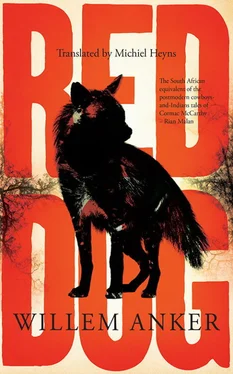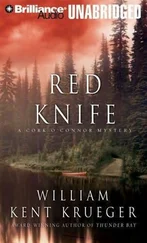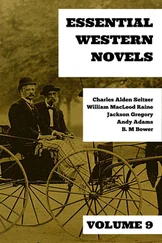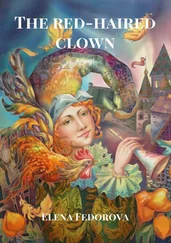You must not believe everything that Midge was to tell later; he was always a handful. But something scratches the Omni-Eye of this Omni-Buys when I read Michiel’s recorded words:
He was sorely aggrieved over the loss of our mother, and in his grief said unto us, that he would leave us there, we should not proceed further into the land, and also not go back. He said also that the white people would eventually arrive. The Lord would provide for us.
When is Father going away, why can’t we go along, asks Gawie.
We’re going along, the little ones chirp.
Coenraad Wilhelm gets up and walks away, Maria is washing dishes, Dirk gazes at me with a look I don’t understand. Then everybody starts chattering and asking questions at the same time. They must have understood enough through my drooling and slurring. I claw the battered Bible closer.
Let us read, I say.
Everyone is silent at once. They look at each other, examine the table top. I stroke the leather, feel the pages, quite possibly the last paper these dead fingers will ever touch. I open the book, search for my place, and begin:
And the first came out red all over like a hairy garment; and they called his name Esau. And after that came his brother out, and his hand took hold on Esau’s heel; and his name was called Jacob: and Isaac was threescore years old when she bore him. And the boys grew: and Esau was a cunning hunter, a man of the field, and Jacob was a plain man, dwelling in tents.
I look up. They don’t understand a single word dropping from my gibbering jaw, but each and every one nods piously and with eyes wandering elsewhere pretends to be listening.
And Isaac loved Esau, because he did eat of his venison: but Rebekah loved Jacob.
I lie behind Maria. Here, at long last, it is not necessary to forgive her her lack of mystery. Tonight it is the familiarity of every wart and mole that I seek out with my mouth. I drink from them as from a colony of breasts. Tonight her gurglings and snorings drone beautifully. I don’t close an eye. I want to make sure my fingers remember every part of her. The sweat at the back of her knees, the smell of her grey frizz, the shapes of her ears. I touch her, but my fingers are dead. To feel her skin I have to sniff her body with my snout, my hands mere front paws, hard and calcified like hooves. In the early hours I get up. She pretends to be sleeping.
I struggle to fasten the buckskin around my hips. Throw a kaross over my shoulders. I scrabble in the pot, wrap the leftovers in a cloth. Slip the herneuter into the loincloth. I sit by the cold embers, smoke a pipe. I wrap hides around my feet, try to tie the thongs with one hand and give up. Johannes comes out of his tent with a baby on his arm, looks me in the eye, soothes the child at his breast, stoops into the tent again. I keep looking at the tent. Nobody appears. I tie a bundle of karosses to my back. It’s too heavy; I drop it. Against the wagon lean the bows and quivers. For that you need two damned arms. I take up my gun, the very last powder horn, the pouch with four bullets. My right leg drags me to the brushwood. One of the dogs charges at me, licks my calf, won’t leave me. I chase him away quietly, but the cur lingers on behind me. I throw stones at him until he stops and then trots back to the camp.
In the Tswapong hills I wanted to die. Here at the edge of the camp, where the bushes close in, my second death then, the demise of my name, of Coenraad de Buys. Adieu, Mijnheer de Buys. Till we meet again, Khula, Kadisha, Moro, Diphafa. Het ga je goed, Kgowe. Farewell, Coen. All that still lives is my raddled body; all that can still die is my woundedness.
See, here we stand. I, the Omni-Buys who has bewhispered you to here, and you, my reader. Further we cannot go. Here we have to take our leave of the man-beast Buys. He is no longer I; he is apocryphal. See, he gazes at the slumbering wagon and tents. The stars are on fire, the moon is meagre, the sun already inexorable on the horizon. He limps on, turns around again. Maria has not emerged from the wagon yet. She is still lying with her face to the side of the tent, her eyes open. You try to catch up with him. My hand to your chest stays you for ever. We see him walk away against the half-light of early morning.

The dogs smelled the weakened creature from far away. The soil has been baked hard, he leaves no tracks. They follow his familiar stench until they see him, this thing with the dragging gait. They see him stumble along the grain of the earth, his left arm swinging to its own measure, the left leg sinew to sinew alongside. His paws are bleeding. Before they trot off to where they can smell the quaggas, the pack greet him as they have done for generations. After a moon’s milky filling and draining they come across him again. He shuffles along bent almost at right angles, the gun in his claw all that keeps him upright. He mutters to himself, does not hear his knife falling behind him and staying there. He stops only when he sees the red dog. He does not move while the dog comes to sniff at him. When the pack see him again half a moon later, he’s prowling on all four paws, the gun and powder horn dangling under his belly. His fur is hanging loose, his knuckles bleed. He scans the world of brushwood and distant cawings. The dogs fell a waterbuck and devour it and forget about the crawling loner. At daybreak they sniff out the bush pigs and guinea fowl. They find him prodding and devouring the insides of a frog. He peels pieces of bark from dead trees, stuffs the teeming crawling creatures into his mouth. His claws find roots in the sand. He digs and pulls and gnaws. He hunkers with a root in the cheek, peers lazy eyed at the bushes and does not see the dogs. His nostrils dilate. The red dog breaks through the branches; the creature’s head turns at an angle. For a moment they regard each other, then they both growl. The pack recalls the red dog. The man-beast has not moved yet; he keeps on gazing. The moon is full again and still in the sky with the morning sun when he comes upon the dogs at the watering hole. Their heads are buried in an eland. The red dog looks up, its hyena-like snout red and dripping. His head drops back into the carcase. With a last shot fired into the air, the monster scatters the dogs. They peer out of the undergrowth at how he descends upon the eland, how he tugs furiously at a hind leg trying to tear it off. He falls forward, head first into the guts. A gnawing and growling sounds from the belly of the eland. When he catches his breath his head is wet, a strip of flesh dangles from his jaws. A dog snaps a branch. He turns his head, he sniffs, his jaws let go of the chewed flesh. He looks up; they are everywhere. They tear away his hides, tear out his hair, tear off his skin; drive their claws into him. Their canines hook onto joints; the bones break. They tear open the body. The red dog grabs a chunk of meat, devours it to one side with his cubs. The dogs devour him; then they devour the rest of the eland. Later they lie in the damp sand next to the watering hole, their tongues smacking. A bitch kecks, vomits out a morsel of bone, gobbles it up again immediately. The cubs snap at each other. When the sand is baked hot, the pack trot into the veldt in search of the slender strips of shade of a thorn tree. At dusk they will trek on.
Читать дальше












